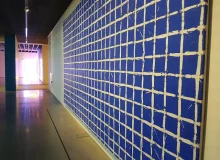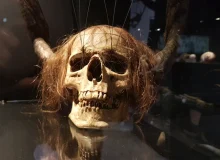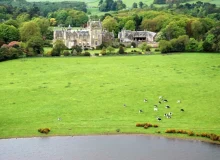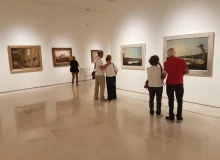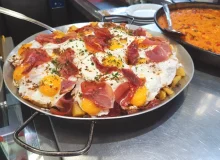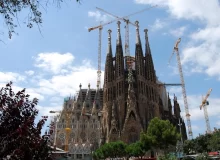Angels and Trampas in Venezuela
It’s a cheerful start to a plane journey, arriving at the airport to pass by what’s left of a plane that came down near your very destination some sixty years previously.

The fact that the plane you’re then strapped into – those of us whose seat buckles worked, that is – is a tiny five-seater Cessna that seems to date from the same era is not reassuring. The pilot blew his nose, switched on the engine, waited a while and then we bumped our way towards the runway. We were headed for the Angel Falls.
The plane that stands outside the airport at Cuidad Bolivar in eastern Venezuela was piloted by an American adventurer with the unlikely but real name of Jimmy Angel. He was searching for gold in the weird landscape of the region, where miniature flat-topped mountains known as ‘tepuis’ thrust up through the thick rain forest. The latest dating suggests these strange sandstone creations are at least 1,800 million years old, long before South America split from Africa a mere 135 million years ago.
Little wonder that one of the 116 tepuis inspired Conan Doyle to write The Lost World, but Jimmy Angel in his four-seater plane landed on top of another tepui, called Auyantepui, the Mountain of the God of Evil. He landed but he couldn’t take off again in the boggy surface, and in the eleven days it took the Angel party to descend to civilisation, they chanced upon the world’s highest waterfall, later named the Angel Falls.
It took Angel eleven days because of the steepness of the tepui and the remoteness of the region which, despite the falls becoming the country’s number one attraction, is still unspoilt and rugged. People fly to the falls because there are no roads into the area around them. Most visitors fly in, fly over the falls, and then fly out again, some without putting a foot on the ground, others buying a brief package to the tiny Pemón Indian town of Canaima, where the sole smart all-inclusive hotel will only take your booking if you also buy a flight over the falls in their own DC-3. We were doing it the hard way, by taking a trip upriver in dug-out canoes, piloted by Pemón Indians.
Back in the Cessna at about 7,000 feet, the green forests of Venezuela spread below us like… well, like something to plunge onto if anything went wrong. A five seater Cessna seems little more than an airborne 2CV, though the pilot was blissfully unconcerned, coping with his cold and, at one point when we entered a cloud bank and there was nothing to see, taking a car repair invoice from his pocket and examining it carefully. The plane bucked a bit, he looked up unconcerned, put his hands on the joystick to level it out and lower the altitude a little, then went back to his invoice.

We flew by tepuis, half-hidden in mist, with tantalising glimpses of waterfalls pouring out of the rust-coloured rock faces. Rivers weaved through the forested valleys between them, blue satin ribbons against green baize. But how would we know when we got to the Angel Falls? Er, silly question, as the pilot banked the plane round a tepui, said ‘Salto Angel’, and there it was, the longest and highest waterfall in the world, a swirling spray of water dropping for almost 1,000 metres.
Its mesmerisingly slow whirling fall of water means you could be forgiven for thinking it was named because it looks like an Angel, a spiritual wisp of white. The pilot banked again and took us in closer, and round again as the shutters clicked. ‘OK,’ he asked, and we nodded, OK, as we knew we now had to journey up-river to see it all again from the bottom.
We seemed to be landing in the middle of nowhere, on a goat track maybe? Bang-bump-thump and we were down, and out of the plane and talking twenty-to-the-dozen about what we’d just seen while we waited for the second plane carrying the rest of our small group. We followed a little girl on a bike to where we’d be spending one night, in a very basic guesthouse in the Pemón village of Kamarata. Our home (girls in one dorm, boys in another, showers and loos in an out-house out back) was brick-built but many of the Indian huts were more like wattle and daub. One was being built nearby – it’s the kind of village where, when someone needs a new house, everyone gets together and builds one.
The builders called us over and offered us some cachiri from a red plastic cup. ‘It’s fermented manioc,’ our Venezuelan tour leader, Virginia, explained. ‘They like to see the expressions on people’s faces when they try it.’ There were a few whose faces screwed up like they’d sucked on a lemon, but I found it not too bad and even had a second cup. I’ve had worse wine in English pubs.
Elsewhere a family was making blowpipes, still used for hunting, and offered us some fruits called guamo, like eating candy floss wrapped tightly round a dark nut. A bunch of what looked like orange bananas was sitting on top of an oil-drum. ‘What are those?’ we asked Virginia. ‘Orange bananas,’ she explained. The father of the family showed us the steering paddle from his boat, so huge and heavy we could barely lift it.

Next morning we went down to the river, where our dug-out was being loaded with luggage, then with us. It hardly seemed credible that the long, low boat could take the ten of us, a tour leader and four Indians, plus baggage, food, hammocks and cooking gear, but it all packed in and off we sailed. Kingfishers zipped across the river like darts from a blowpipe, and swifts and swallows scooped water as they passed in front of the boat. The rain forest hemmed us in on either side, but ahead as we turned corners were dramatic views of the cloud topped tepuis against the deep-blue sky.
We stopped at simple campsites, where our hammocks were strung between the struts of open-sided huts. The Indians were interested in our nightly addiction to card games, and asked via Virginia if we’d teach them one. The choice was ‘Cheat!’, which translated into Spanish as a satisfying shout of ‘Trampa!’ when you accused someone of lying about the cards they said they were placing face-down in front of them. We practised our numbers and the words for ace, king, queen and jack in Spanish, and began.
The Indians didn’t seem to get the idea at first. ‘It’s difficult for them,’ said Virginia, ‘as cheating is just something that’s totally alien to their culture. They are so absolutely honest.’ Gradually they realised what cheating was all about, and the puzzled looks gave way to impish grins as they trampa’d away like mad. We went to bed slightly concerned that we had introduced the art of cheating to the Pemón Indians, and it would destroy their culture completely.
Next day our crew of cheery trampas steered us up the Rio Churrún, hurtling the boat through rapids swollen by the overnight rain, to our final campsite near the foot of the Salto Angel. The following morning I awoke early, pulled on some shorts and tip-toed away from the gently swaying rows of hammocks in the shelter.

As I walked towards the river I met another of the group, Larry, also an early riser. ‘Hey,’ he said, excited, ‘come through here, there’s the most fantastic view of the Falls.’ I followed him along a forest track till it emerged in a clearing overlooking the river, across from which was a magnificent view of… absolutely bugger all. A canvas of grey. ‘Well it was there five minutes ago,’ said Larry, before going back to the campsite.
I sat on a damp log and looked across at the blanket of mist. There was a hint of watery sun behind it. Parts of the mist began to break up, and little holes of blue sky appeared. The top of the tepui was visible about half a mile away, hanging high above the river – in fact almost a thousand metres above me: the full extent of the Falls is 979 metres, as the main drop bounces off rocks and another fall emerges from the spectre of water to plunge down into the river I was sitting beside.
I could now see the top of the falls, where the narrow but thick jet of water gushed from the rocks into space and the effects of gravity. More mist cleared, till eventually the full length of the falls was visible, bright as a string of pearls in the early morning light. It was still only 7am. A few mist patches drifted past, and against these moving white rags a flock of swifts flew by, twisting in a mass like a shoal of little black fish. I felt I could have stayed there forever, like the name of Jimmy Angel did.
